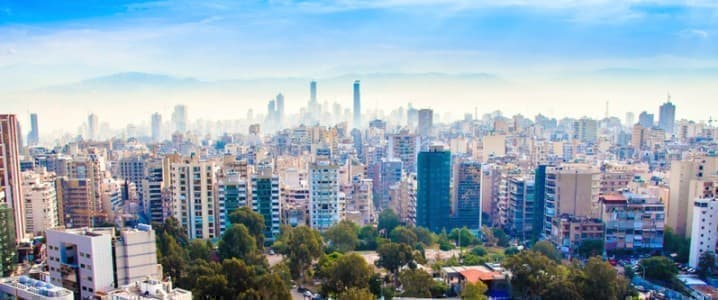After losing energy for 24 hours in 2021, Lebanon has continued to face severe energy shortages due to years of poor investment in infrastructure that has led many to rely on polluting diesel generators for their power. The Lebanese population gets between one and two hours of electricity a day at present, and with ongoing political instability, there is little hope of this changing any time soon. So, how might Lebanon repair its failed energy sector?
Lebanon’s economic crisis started in 2019 after excessive spending led to increased debt and increased political tensions, with no external power willing to bail the country out. As the currency rapidly depreciated, losing around 90 percent of its value to date, much of the broad middle-class was forced into poverty. In 2021, estimates suggest that state debt reached 495 percent of GDP. In terms of power, Lebanon has faced rolling blackouts for years due to poor infrastructure spending. Now, with such high debt, the government can no longer afford to run national power plants, meaning people have barely any access to electricity from the grid.
With no political power taking responsibility for the economic and energy crises, few external powers have been willing to step in to help. In addition, the rise of the militia group Hezbollah is driving others away. But several neighbouring countries have communicated their willingness to offer assistance if Lebanon can achieve greater political stability.
Saudi Arabia broke relations with Lebanon around four years ago after Iran-supported Hezbollah grew in power. But now, Lebanon's Prime Minister Najib Mikati is expected to visit Saudi Arabia to potentially mend relations. As Iran and the U.S. continue in talks to come to a nuclear agreement, with the potential reinstatement of the JCPOA, it’s in Saudi Arabia’s best interests to rebuild relations with other Arab states.
However, several neighbouring countries are reluctant to give Lebanon funding unless it can form a stable government, having previously lost money in the country. If realistic economic reforms can be established, allowing for a deal with the IMF, Saudi Arabia and others may be willing to invest.
In January, Jordan signed a contract with both Lebanon and Syria to supply its electricity to Lebanon. The agreement will allow for 250MW of energy to be sent to Lebanon via the Syrian power network to help ensure greater energy security by delivering around double the current electricity ration. The project is expected to cost around $200 million, with funding coming from the World Bank.
Related: OPEC+ Missed Its March Output Quota By 1.45 Million Bpd
This could alleviate some of the difficulties faced day-to-day in Lebanon from electricity shortages. However, the country’s energy system requires a complete overhaul to establish any long-term potential for energy security. State-run energy firm Électricité du Liban (EDL) is on the brink of collapse. Marc Ayoub, Energy Researcher at the American University of Beirut’s Issam Fares Institute, explained “In the absence of any political solutions, we’re just kicking the can down the road.” And “If we pay $200m, we carry on for two or three more months, then what? We cannot continue like this,” he added.
The Lebanese government sees a way out through a new energy reform, but it is still unclear whether this is realistic. In mid-March, Lebanon’s cabinet approved a strategy for the restructuring of the country’s energy sector, in an attempt to appeal to donors. The reform will allow for the establishment of an electricity regulatory authority in 2022 and will see an increase in electricity tariffs. Through an investment of $3.5 billion in the reform, the government hopes to achieve 24-hour power across Lebanon by 2026. But with a poor track record for following through with previous energy reforms, donors do not have much confidence in the new plan.
Experts say that Lebanon must consider renewable sources for viable new energy reform, with the potential for establishing greater energy security based on domestic resources. A 2020 report from the International Renewable Energy Agency suggests that Lebanon could develop its renewable energy sector substantially, with around 300 days of sun a year and the potential to tap wind and hydropower.
And Lebanon appears to be responding to this suggestion. A 2022 policy statement by the Ministry of Energy and Water includes plans to develop 1,200MW of solar and wind power and 200MW of solar storage by 2026. Nonetheless, for this to be achieved, it would take significant external funding and effective government oversight.
Jordan could provide a mid-term solution to Lebanon’s energy problems, adding enough electricity to the grid to diminish the challenges faced due to Lebanon’s energy crisis. But a long-term solution simply can’t be established until political stability is achieved and a clear energy reform can be implemented. International bodies and neighbouring states are willing to invest in the future of Lebanese energy, both fossil fuels and renewables, but without the assurance that their money won’t be lost, Lebanon will remain in a state of severe energy insecurity.
ADVERTISEMENT
Bu Felicity Bradstock for Oilprice.com
More Top Reads From Oilprice.com:
- JPMorgan: Immediate EU Ban On Russian Oil Could Send Prices To $185
- EU In Talks With Alternative Suppliers As It Considers A Russian Oil Ban
- Libya May Reach Full Oil Production Within Days


















